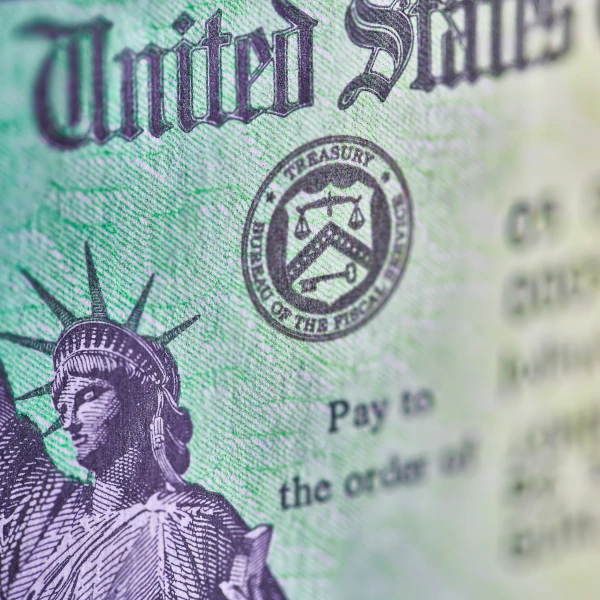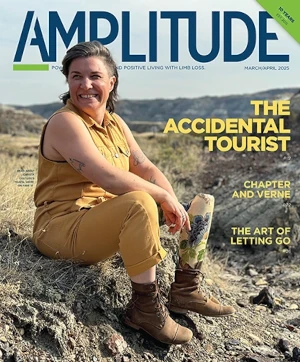by Kim Ousley

ED NOTE: Two reports released this week estimate the heavy costs (in jobs and lives) of the Medicaid budget cuts pending before Congress. One, released by the Kaiser Family Foundation, estimates that the budget cuts would amount to a 29 percent reduction in state Medicaid spending. The other, published by George Washington University’s Milken Institute, estimates the cuts would lead to the elimination of a million jobs (mostly in healthcare) nationwide, while decreasing GDP by more than $100 billion per year.
But those are just numbers. To get a sense of the human-scale impact, Amplitude asked one person living with limb loss to describe how her life would change if she lost even part of her Medicaid check. Kim Ousley’s story isn’t uncommon within the amputee community.
I’m both an amputee and a five-time synovial sarcoma cancer survivor. My journey started in June 2010, when I was a temporary employee and did not have health insurance. It was a job in public relations, and with a young adult child in college, I took the position in hopes of it becoming full time. I had finally achieved my bachelor’s degree, and I just knew this was my time to shine. I never dreamed I’d lose everything I had worked for up to that point, including work, home, and finances.
Being diagnosed with cancer, then hearing that I needed an amputation to save my life, put me in shock. I immediately applied for SSDI and Medicaid, although I had no idea if and when I might qualify. I also needed to find a place to live that was handicapped accessible. I would be in a wheelchair for at least six months while doing chemotherapy and then waiting to heal enough that I could be fitted for my first prosthetic leg.
That life-changing event happened 15 years ago. I haven’t been able to return to fulltime work, but I do freelance as an accessible travel writer. And I want to share all the unpaid things I do to contribute to the community, so you know I don’t just sit at home all day. I am Certified Peer Mentor, supporting new amputees through the Amputee Coalition, as well as a Lead Advocate who works with legislators to improve services and healthcare for amputees. I am also a certified cancer support mentor through another organization. I volunteer at a nonprofit called Gilead Ministries, which supports cancer patients; they supported me throughout my entire journey. Another of my favorite places to volunteer is my local state park. I’ve been doing this for 15 years now. And I help homeless and low-income folks at a local community center, where they come for food, showers, clothes, and a smile and a kind word.
Since I first applied for SSDI and Medicaid benefits 15 years ago, they have lost a lot of their purchasing power. They used to enable me at least to keep my head above water. Now I am genuinely concerned about sliding into the abyss of financial ruin. I have always been frugal, ever since becoming a single parent many years ago. But now when my check hits on the third of every month, after I pay the rent, utilities, and other basics, I only have about $300 to live on for the rest of the month. That amount has to cover food, gas, medicines (including insulin), clothing, laundry, and everything else.
In January 2024, I found out that Medicaid had cut off my dental and optical—just when I broke a front tooth and needed new eyeglasses. I was told I make too much income to qualify for those benefits any longer. I also had to start paying for Medicare Part D. First it was around $10.30 per month. This year it went up to $28.20 per month. My medicines, especially all three types of insulin I am presently on, went up almost three times as much. The cost of food and gas went up and keeps rising. But that 2.7 percent cost-of-living increase on my check barely makes a dent. Presently I consider myself to be in the red each month.
And that was before I found out the transmission on my beautiful 2011 Nissan Rogue is toast. There’s no money to replace the car, and it’s not worth fixing at this point with 294,000 miles on it. I need my own vehicle to be independent, and to continue building my freelance career as an accessible travel writer. I have many other things on my long list of needs; some of them have been there forever. I’m used to doing without and surviving on what I have, but I’m not sure I’ll be able to much longer.
I would love to see reform involving Medicaid, but I envision changes that improve services, not deny them. Everyone who relies on this program has worked hard, paid into it, and deserves to be taken care of properly. I don’t ask to become rich. I just want the benefits to keep pace with the cost of living, so I can survive without worrying if next month’s check will get skimpier—or cease to exist entirely. I already cannot afford even the reduced or low-cost dental and optical. Nor can I afford the plans separate from the Medicaid system. But having the ability to see and chew and breathe are pretty important. What can be done to change this?
I just discovered this little AI thing called Chat GPT. I asked what it would suggest to improve Medicaid. It recommended expanding access in all 50 states, increasing affordability, and enhancing quality of care. Some other suggestions were to increase income eligibility limits, expand telehealth access, cap out-of-pocket costs, and focus on preventive care. One of my favorite ideas that Chat GPT raised is to simplify enrollment and renewals. Every year I get the letter saying I need to requalify for Medicaid. Wouldn’t it be better to automatically re-enroll me yearly, rather than having me send in the same paperwork over and over? We could save a whole forest, not to mention all the time that’s needed to process all that paperwork. I’m all for going paperless. I love trees.
I’m now a diabetic thanks to the chemotherapy that ruined my pancreas. If I were to lose Medicaid, I don’t know how I could pay for the insulin, needles, and other supplies I need to survive. My health would take a turn for the worse, and I would require care that’s way more expensive than insulin. Or I might have to do what I’ve seen other people do, and sacrifice food intake so I can afford my meds. When the government cuts my benefits, I always get asked, “Can’t you get help from your family or your church?” And the church folks always say, “There are government programs to help you.” When I broke my wrist recently and wasn’t able to drive, I was told I don’t qualify for any transportation services under my plan. Friends and relatives are busy with their jobs and families; they suggested I take public transportation, but it’s not always reliable, it’s hard to use as an amputee, and it’s not conducive for getting to and from medical procedures and appointments. Try riding the bus after chemo, and see if you can make it home without losing whatever sustenance is left in your stomach. It’s a very helpless, vulnerable feeling.
I’m not sharing these reflections to make anyone feel sorry for me. But try to visualize your loved ones and neighbors in similar situations or worse. People with limb loss and other disabilities are barely making it month to month. Many don’t have anyone to help them, check on them, or make sure they’re getting the proper support at school, work, and home environments.
Community is important now more than ever. My question to everyone is, what will it take to bring us all together to make this happen? We can begin by educating ourselves, working together for the good of everyone, and committing to leave no one behind.
Kim Ousley is a travel writer and Certified Lead Advocate for the state of Indiana. She blogs about travel at Out on a Limb.




